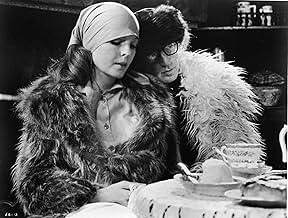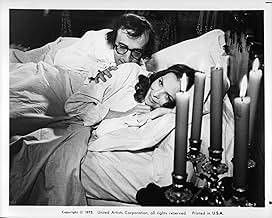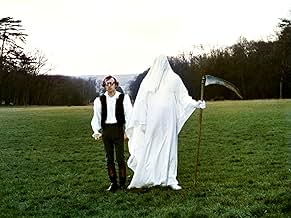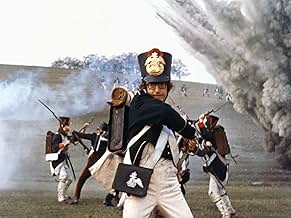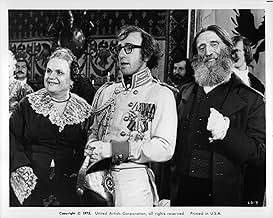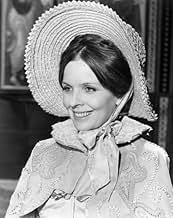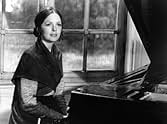CALIFICACIÓN DE IMDb
7.6/10
43 k
TU CALIFICACIÓN
En la Rusia de los zares, un soldado neurótico y su primo lejano planean el asesinato de Napoleón.En la Rusia de los zares, un soldado neurótico y su primo lejano planean el asesinato de Napoleón.En la Rusia de los zares, un soldado neurótico y su primo lejano planean el asesinato de Napoleón.
- Dirección
- Guionista
- Elenco
- Premios
- 1 premio ganado y 1 nominación en total
Féodor Atkine
- Mikhail
- (as Feodor Atkine)
Yves Barsacq
- Rimsky
- (as Yves Barsaco)
Gérard Buhr
- Servant
- (as Gerard Buhr)
Henri Czarniak
- Ivan
- (as Henry Czarniak)
- Dirección
- Guionista
- Todo el elenco y el equipo
- Producción, taquilla y más en IMDbPro
Opiniones destacadas
When Napoleon invades the Russian Empire during the Napoleonic wars, Boris Grushenko (Woody Allen), a "militant coward" and pacifist scholar, is forced to enlist in the Russian Army, desperate and disappointed hearing the news that his cousin Sonja (Diane Keaton) is to wed a herring merchant.
The film is full of philosophical and pseudo-philosophical commentary. In one instance, a priest suggests that Spinoza proves God's existence. Boris and Sonja banter back and forth about epistemology and such, and only once does Sonja really offer any advice worth taking in: that "to love is to suffer and to not know love is to suffer", which really amounts to little more than "life is suffering", something the Buddhists or Schopenhauer would have embraced.
But then again, you have wise men spouting off silliness, including the view that German Jews have stripes, and Russian Jews have horns. We are left to conclude, as Boris quickly does, that being logical in an illogical world is a complex and unfavorable situation.
It has been said that the use of Sergei Prokofiev for the soundtrack adds to the Russian flavor of the film. Other parts referencing Russian culture include a dialogue between Boris and his father with each line alluding to or being composed entirely of Dostoevsky titles. This is crucial to really get the point of how backwards everything was across.
I was not able to fully appreciate the film because I am ignorant of its references to the works of Bergman (notably "Persona" and "Smiles of a Summer Night"). But that is true of much of Allen's work, I think. His constant references to Dostoevsky did reach me but may have been missed by others. Yet, even if few completely "get" the picture, it remains beautiful and humorous just the same. Allen has called this his favorite picture, even more so than "Annie Hall". I have to see more to be sure, but as of now I am inclined to agree.
The film is full of philosophical and pseudo-philosophical commentary. In one instance, a priest suggests that Spinoza proves God's existence. Boris and Sonja banter back and forth about epistemology and such, and only once does Sonja really offer any advice worth taking in: that "to love is to suffer and to not know love is to suffer", which really amounts to little more than "life is suffering", something the Buddhists or Schopenhauer would have embraced.
But then again, you have wise men spouting off silliness, including the view that German Jews have stripes, and Russian Jews have horns. We are left to conclude, as Boris quickly does, that being logical in an illogical world is a complex and unfavorable situation.
It has been said that the use of Sergei Prokofiev for the soundtrack adds to the Russian flavor of the film. Other parts referencing Russian culture include a dialogue between Boris and his father with each line alluding to or being composed entirely of Dostoevsky titles. This is crucial to really get the point of how backwards everything was across.
I was not able to fully appreciate the film because I am ignorant of its references to the works of Bergman (notably "Persona" and "Smiles of a Summer Night"). But that is true of much of Allen's work, I think. His constant references to Dostoevsky did reach me but may have been missed by others. Yet, even if few completely "get" the picture, it remains beautiful and humorous just the same. Allen has called this his favorite picture, even more so than "Annie Hall". I have to see more to be sure, but as of now I am inclined to agree.
"Love and Death" is one of Woody Allen's "early, funny ones," before he made darker and more serious films, such as "Stardust Memories" (1980) where Allen's line about his own oeuvre originates. He made "Annie Hall" (1977) next, and his career would never be the same. On the other hand, being a parody of 19th-century Russian literature, "Love and Death" is full of esoteric references. The major throughline is Leo Tolstoy's "War and Peace," but there's enough Fyodor Dostoevsky here for me to have reviewed it as part of my mission to see a bunch of "Crime and Punishment" pictures after reading the book. Moreover, Allen would go on to make three movies (thus far) more heavily and singularly inspired by this particular novel: "Crimes and Misdemeanors" (1989), "Match Point" (2005) and "Irrational Man" (2015). It's interesting to compare how he went from "Love and Death," which is non-stop comedic frivolity complete with a gag being performed at every moment to "Match Point," where there are no jokes.
Indeed, "Love and Death" is not only an homage to literature, but also to early screen comics. There's even a scene where the sound goes out for some silent slapstick, and the fourth-wall-breaking absurdity of the whole thing seems to be especially indebted to the Marx Brothers. As for the Russian connection, though, there are extended mock-philosophical discussions, angst over the existence of God, somber soliloquies, multiple suitors and lovers for everyone, subplots upon subplots and periphery character galore, a lot to do with class and nationality, and... wheat, I guess. (I love that in a blog post from Alistair Ian Blyth that one of my favorite films of the 1910s, "After Death" (1915), which is based on the prose of Ivan Turgenev, is brought up to help explain the supposed importance of wheat in Russian literature.)
Some of the Dostoevsky references are obvious. Allen has a conversation in a jail cell that entirely exists of characters and titles from his stories, including some gossip about a local named "Raskolnikov" who murdered two women. Additionally, Diane Keaton's character is named "Sonja," the hooker with a heart of gold who instigates Raskolnikov's regeneration in the book. "Love and Death" offers the best character summary of Sonja, though, from her own lips: "I'm half saint, half wh-re" (IMDb censorship, you know). And, naturally, Allen plays the atheistic foil to her pious promise land. Best of all, however, is how the connection with Napoleon between "War and Peace" and "Crime and Punishment" is exploited in this film with two other words surrounding the conjunction. Sonja decides that she and Allen's Boris should kill Napoleon for the benefit of humanity, which is akin to the rationale of Raskolnikov for murdering the pawnbroker. Ironically, Napoleon was also his role model for this "extraordinary" act. Boris mixes up the roles further by comparing himself to an insect, which is what Raskolnikov said of the pawnbroker, and claiming Napoleon as a great man. Looking at the parodic adaptation this way gives one as much whiplash as Allen and Keaton's philosophical repartee. To top it off, there are two Napoleons.
There are some allusions to non-comedic films here, too. The ones to "Battleship Potemkin" (1925) and "Persona" (1966) seemed most conspicuous to me. Although "Love and Death" is a lightweight affair, and the jokes are hit and miss, it rewards those who've seen and read what it parodies. And, admittedly, Russian novels such as "Crime and Punishment" were just asking for this sort of loving pillory.
Indeed, "Love and Death" is not only an homage to literature, but also to early screen comics. There's even a scene where the sound goes out for some silent slapstick, and the fourth-wall-breaking absurdity of the whole thing seems to be especially indebted to the Marx Brothers. As for the Russian connection, though, there are extended mock-philosophical discussions, angst over the existence of God, somber soliloquies, multiple suitors and lovers for everyone, subplots upon subplots and periphery character galore, a lot to do with class and nationality, and... wheat, I guess. (I love that in a blog post from Alistair Ian Blyth that one of my favorite films of the 1910s, "After Death" (1915), which is based on the prose of Ivan Turgenev, is brought up to help explain the supposed importance of wheat in Russian literature.)
Some of the Dostoevsky references are obvious. Allen has a conversation in a jail cell that entirely exists of characters and titles from his stories, including some gossip about a local named "Raskolnikov" who murdered two women. Additionally, Diane Keaton's character is named "Sonja," the hooker with a heart of gold who instigates Raskolnikov's regeneration in the book. "Love and Death" offers the best character summary of Sonja, though, from her own lips: "I'm half saint, half wh-re" (IMDb censorship, you know). And, naturally, Allen plays the atheistic foil to her pious promise land. Best of all, however, is how the connection with Napoleon between "War and Peace" and "Crime and Punishment" is exploited in this film with two other words surrounding the conjunction. Sonja decides that she and Allen's Boris should kill Napoleon for the benefit of humanity, which is akin to the rationale of Raskolnikov for murdering the pawnbroker. Ironically, Napoleon was also his role model for this "extraordinary" act. Boris mixes up the roles further by comparing himself to an insect, which is what Raskolnikov said of the pawnbroker, and claiming Napoleon as a great man. Looking at the parodic adaptation this way gives one as much whiplash as Allen and Keaton's philosophical repartee. To top it off, there are two Napoleons.
There are some allusions to non-comedic films here, too. The ones to "Battleship Potemkin" (1925) and "Persona" (1966) seemed most conspicuous to me. Although "Love and Death" is a lightweight affair, and the jokes are hit and miss, it rewards those who've seen and read what it parodies. And, admittedly, Russian novels such as "Crime and Punishment" were just asking for this sort of loving pillory.
This Woody Allen flick is by far the funniest of his that I have seen thus far, although i don't think its as good as a film as Annie Hall or The Purple Rose of Cairo, both which I consider masterpieces of Woody's, Love and death is still a brilliant film. The story of Boris Grushenko (Allen), a Russian who is caught up in the invasion of the french lead by Napoleon (Tolkan). Meanwhile he also loves Sonja (Keaton), a girl who has confusions of her own. The film is written brilliantly, great dialogues and wit, its truly offbeat humor, the funniest from Woody. Although his direction here is a bit weird, and at times the plot is not believable at all and obviously satirical, the performances and great dialogues make it work. It was a bit redundant and had a bit too much slapstick at times but still enjoyable. Watching this film, truly had me laughing throughout. Woody was perfect in his role, probably my favorite acting from him along with his acting in Annie Hall. Diane Keaton was also great here, not as good as her other work in this decade (GF, GF2 and Annie Hall), however still great here. James Tolkan was also great as Napoleon. 9/10 #91 on list of all time favorite films
Although the critics loved Annie Hall and some of Allen's other films more than this one, I think this is his best combination of comedy and philosophy. I would strongly recommend this to any fan of Russian history, comedy, philosophy, or Woody Allen.
As a huge Woody Allen fan, I was delighted and surprised by this film. I have scarcely heard anyone mention it, but for my money it is the single most comically dense of all of Woody's films. There are so many truly impressive/hilarious/memorable one-liners that I'm amazed people don't quote this movie left and right. The setting, costumes, accents all add to the hilarity of the film--truly reminiscent of a Marx Brothers romp. Really outstanding among his pre-Annie Hall films. Only rivaled by Bananas in my opinion for simple laugh value.
Unlike any other of his films, this deals with his "deep" questions of death/metaphysics in an unflaggingly light and comical fashion. For instance:
Sonja: But judgment of any system or a priori relation of phenomena exists in any rational or metaphysical or at least epistemological contradiction to an abstracted empirical concept such as being or to be or to occur in the thing itself or of the thing itself.
Boris: Yeah, I've said that many times.
Not Woody's "best" film (see Annie Hall, Manhattan, Crimes and Misdemeanors), but perhaps his most laugh-filled. Satisfying throughout. I give it a 9/10.
Unlike any other of his films, this deals with his "deep" questions of death/metaphysics in an unflaggingly light and comical fashion. For instance:
Sonja: But judgment of any system or a priori relation of phenomena exists in any rational or metaphysical or at least epistemological contradiction to an abstracted empirical concept such as being or to be or to occur in the thing itself or of the thing itself.
Boris: Yeah, I've said that many times.
Not Woody's "best" film (see Annie Hall, Manhattan, Crimes and Misdemeanors), but perhaps his most laugh-filled. Satisfying throughout. I give it a 9/10.
¿Sabías que…?
- TriviaIn an interview with 'Esquire' magazine, Woody Allen once said of the making of this movie: "When good weather was needed, it rained. When rain was needed, it was sunny. The cameraman was Belgian, his crew French. The underlings were Hungarian, the extras were Russian. I speak only English - and not really that well. Each shot was chaos. By the time my directions were translated, what should have been a battle scene ended up as a dance marathon. In scenes where Keaton and I were supposed to stroll as lovers, Budapest suffered its worst weather in twenty-five years".
- ErroresThe young Boris has blue eyes, but the adult Boris has brown eyes.
- Citas
Sonja: To love is to suffer. To avoid suffering one must not love. But then one suffers from not loving. Therefore, to love is to suffer; not to love is to suffer; to suffer is to suffer. To be happy is to love. To be happy, then, is to suffer, but suffering makes one unhappy. Therefore, to be unhappy, one must love or love to suffer or suffer from too much happiness. I hope you're getting this down.
- Créditos curiososRussian composer Sergei Prokofiev is listed in the credits as "S. Prokofiev," just the way he would have been listed in the credits of a Russian film.
- Versiones alternativasThe MGM DVD release deletes the pre-title Prokofiev overture.
- ConexionesFeatured in V.I.P.-Schaukel: Episode #7.3 (1977)
Selecciones populares
Inicia sesión para calificar y agrega a la lista de videos para obtener recomendaciones personalizadas
- How long is Love and Death?Con tecnología de Alexa
- What is the music that plays in the opening and closing credits? Where else might I have heard it?
- Who plays Boris as a youngster?
Detalles
- Fecha de lanzamiento
- País de origen
- Sitio oficial
- Idioma
- También se conoce como
- Amor y muerte. La última noche de Boris Grushenko
- Locaciones de filmación
- Productora
- Ver más créditos de la compañía en IMDbPro
Taquilla
- Presupuesto
- USD 3,000,000 (estimado)
- Total en EE. UU. y Canadá
- USD 20,123,742
- Total a nivel mundial
- USD 20,123,742
Contribuir a esta página
Sugiere una edición o agrega el contenido que falta

Principales brechas de datos
What is the Hindi language plot outline for La última noche de Boris Grushenko (1975)?
Responda

